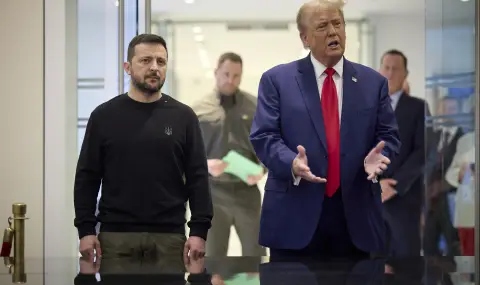The outcome of the US presidential election will determine not only the country's future - it will also have existential significance for Ukraine.
America is Ukraine's biggest supporter in its bid to defend itself from Russian invasion. Under President Joe Biden, the US has so far provided Ukraine with nearly $175 billion in aid, weapons and intelligence. Whoever is elected president on November 5th will hold Ukraine's fate in their hands. From there, there are three options: the US could reduce its aid to Ukraine, keep it the same level or increase it, says Michaela Mattes, a professor of political science at the University of California, Berkeley.
Kamala Harris, Russia and the war in Ukraine
The Democratic presidential candidate, current Vice President Kamala Harris, has made her support for Ukraine clear. "Harris has promised to stay with Ukraine as long as necessary", political scientist Sean Donahue told DW. According to him, Harris would also be "more willing to allow the use of long-range American weapons against targets on Russian territory".
And Mattes believes that Harris will at least continue to support Ukraine in the same way and maintain sanctions against Russia. She could even take a tougher stance and become more aggressive in order to build her reputation as a strong leader. In addition, European security and global stability are important to the current vice president. "Harris sees Russia as a dangerous country that has violated international law and done something immoral that cannot be trusted," Mattes emphasizes.
Donald Trump, Russia and the War in Ukraine
Republican presidential candidate Donald Trump has a different approach to Ukraine. He has a complicated relationship with Ukraine, including his attempt to pressure President Volodymyr Zelensky to open an investigation into Biden, which led to his first impeachment. And, touting his relationship with Russian President Vladimir Putin, Trump has argued that the war would not have happened if he had been president.
Now the former president has promised to end the war “within 24 hours” if he were re-elected. He hasn’t said exactly how he plans to do so, but many assume that any peace deal would benefit Russia. Trump could force Ukraine to accept some kind of freeze on the conflict roughly along the current front lines, which would come at the expense of its territory, Donahue said. It’s unclear whether Putin would accept such terms in the long run, but they would give his military time to rearm.
The Republican nominee has also made it clear that Europe needs to provide a greater share of support for Ukraine, says Dominik Tolksdorf of the German Council on Foreign Relations. If the United States reduces or stops its aid to Ukraine, European governments will find it difficult to provide it themselves. That would give the Kremlin more leeway to impose its will on Ukraine, Tolksdorf said.
Ukraine and NATO Membership
Another complex issue is Ukraine’s desire to join NATO. At some point, Harris is likely to support Ukraine’s NATO membership, Donahue said. One option being discussed is a membership model in which Ukraine would not restore its 1991 borders. In that case, NATO would only defend the territory currently controlled by Ukraine. This was the case with West Germany before reunification.
On the other hand, Trump has been a fierce critic of NATO, even suggesting that the alliance should not defend members that do not spend enough on defense. Still, Trump could bring Ukraine closer to NATO as part of a deal to end the war, says Kurt Volker, the former U.S. permanent representative to NATO. Ukraine’s presence in NATO would be part of “permanent peace and permanent deterrence,” he suggests.
Much will depend on the next Congress
It’s not just who the new U.S. president is, but also what the balance of power in the new Congress, which ultimately approves spending bills, will be. Of the 100 seats in the Senate, 34 will be up for reelection, as will all 435 seats in the House of Representatives. Democratic control of the House will be crucial for Harris to continue providing weapons and aid to Ukraine.
At the same time, many Republicans believe that China, Iran and North Korea are indirectly involved in the war against Ukraine, says Dominic Tolksdorf. For them, a Ukrainian defeat would be a strategic success for these enemy countries and would weaken the US position in the world, he says.
Americans are skeptical of Russia
Another concern is that the American public will grow war-weary. The percentage of Americans who believe that Russia's invasion of Ukraine is a threat to US interests has decreased significantly since 2022, according to a survey conducted in early July by the Pew Research Center. It shows that 69 percent of Americans approve of economic sanctions against Russia, while 54 percent are in favor of the US continuing to send military equipment to Ukraine. Americans are generally evenly divided on whether the country has any obligation to help Ukraine.
Russia is undoubtedly hoping for a Trump victory - not only because he could help Putin gain ground in Ukraine, but also because as president he could further divide the United States and destabilize American democracy, says Tolksdorf.
"The hope in the Kremlin is that under Trump the United States will be mostly self-absorbed and unable to be an active player in international politics," he concludes.
Author: Timothy Rooks
